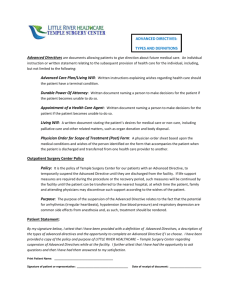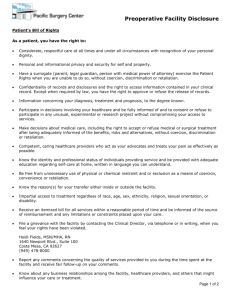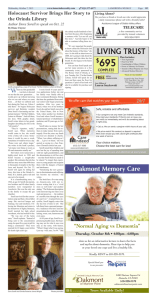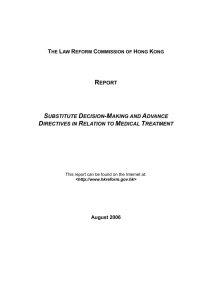Advance Health Directives
advertisement
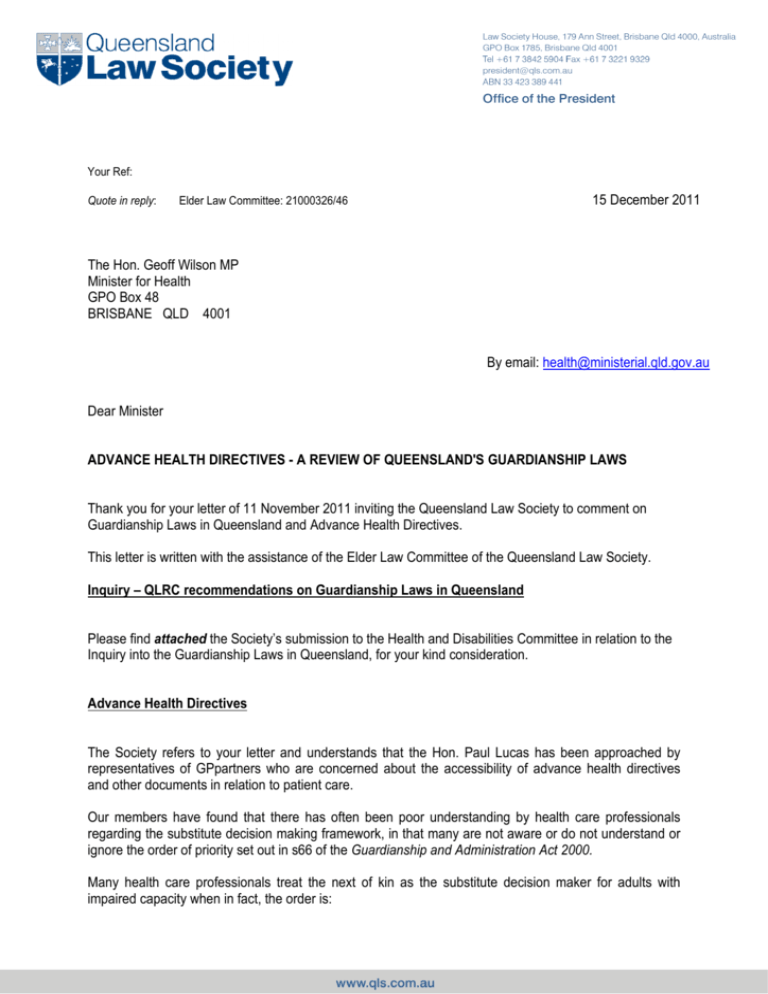
Your Ref: Quote in reply: 15 December 2011 Elder Law Committee: 21000326/46 The Hon. Geoff Wilson MP Minister for Health GPO Box 48 BRISBANE QLD 4001 By email: health@ministerial.qld.gov.au Dear Minister ADVANCE HEALTH DIRECTIVES - A REVIEW OF QUEENSLAND'S GUARDIANSHIP LAWS Thank you for your letter of 11 November 2011 inviting the Queensland Law Society to comment on Guardianship Laws in Queensland and Advance Health Directives. This letter is written with the assistance of the Elder Law Committee of the Queensland Law Society. Inquiry – QLRC recommendations on Guardianship Laws in Queensland Please find attached the Society’s submission to the Health and Disabilities Committee in relation to the Inquiry into the Guardianship Laws in Queensland, for your kind consideration. Advance Health Directives The Society refers to your letter and understands that the Hon. Paul Lucas has been approached by representatives of GPpartners who are concerned about the accessibility of advance health directives and other documents in relation to patient care. Our members have found that there has often been poor understanding by health care professionals regarding the substitute decision making framework, in that many are not aware or do not understand or ignore the order of priority set out in s66 of the Guardianship and Administration Act 2000. Many health care professionals treat the next of kin as the substitute decision maker for adults with impaired capacity when in fact, the order is: ADVANCE HEALTH DIRECTIVES: A REVIEW OF QUEENSLAND’S GUARDIANSHIP LAWS│2 • • • • The directions and the attorney appointed under an Advance Health Directive; (or if there’s no Advance Health Directive); A guardian appointed by the Tribunal; (or if there is no guardian appointed); The attorney appointed under an Enduring Power of Attorney; (or if there’s no Enduring Power of Attorney);1 The Statutory Health Attorney who is available and in the following order: o A spouse of the adult; or o An unpaid carer for the adult who is over 18 years of age; or o A close friend or relative of the adult who is over 18 years of age and not a paid carer of the adult; or if all the above is not available; o The Adult Guardian.2 Often health care institutions lack systems to prompt patients and interested parties for information on Advance Health Directives, guardianship Tribunal appointments, enduring powers of attorney or statutory health attorneys. This issue is compounded in that there is no formal registration system to assist health care professionals when making key decisions about patient care. Some of our members have attempted to ameliorate this by providing their clients cards to place in their wallets advising any reader about instruments held in their office, together with certified copies of enduring powers of attorneys and similar documents. Often the attorneys are provided with certified copies of these documents as well. Our members have found that they have mainly prepared and witnessed enduring powers of attorney (rather than an Advance Health Directives) as: • It is difficult for clients to contemplate an Advance Health Directive; • It is difficult to obtain instructions in anticipation of a client losing capacity, particularly in circumstances where a terminal illness has not already diagnosed; • It is less invasive for the client than an Advance Health Directive, which deals with end of life decisions; • It is not required to be signed by a doctor, whereas an Advance Health Directive is required to be signed by a doctor. As doctors and health care professionals are more familiar with Advance Health Directives, our members have found that in some circumstances health care professionals have insisted on only considering Advance Health Directives and have ignored enduring powers of attorney. There has also been some misconception as to whether certified documents may be used. Ultimately, the problems identified can be addressed by: • educating health care professionals and members of the public as to the operation of these documents when making key decisions about patient care; • introducing a central online system of registration for enduring powers of attorney and advance health directives; and • updating the EPA and AHD forms to outline the order of priority for substitute decision makers to make decisions for adults with impaired capacity pursuant to s66 of the Guardianship and Administration Act 2000. Thank you again for the opportunity to make comments in this very important area of law. 1 2 s66 Guardianship and Administration Act 2000 (QLD) s63 Powers of Attorney Act 1998 (QLD) ADVANCE HEALTH DIRECTIVES: A REVIEW OF QUEENSLAND’S GUARDIANSHIP LAWS│3 If you have any queries regarding the contents of this letter, please do not hesitate to contact our Policy Solicitor, Louise Pennisi on (07) 3842 5872 or l.pennisi@qls.com.au Yours faithfully Bruce Doyle President


